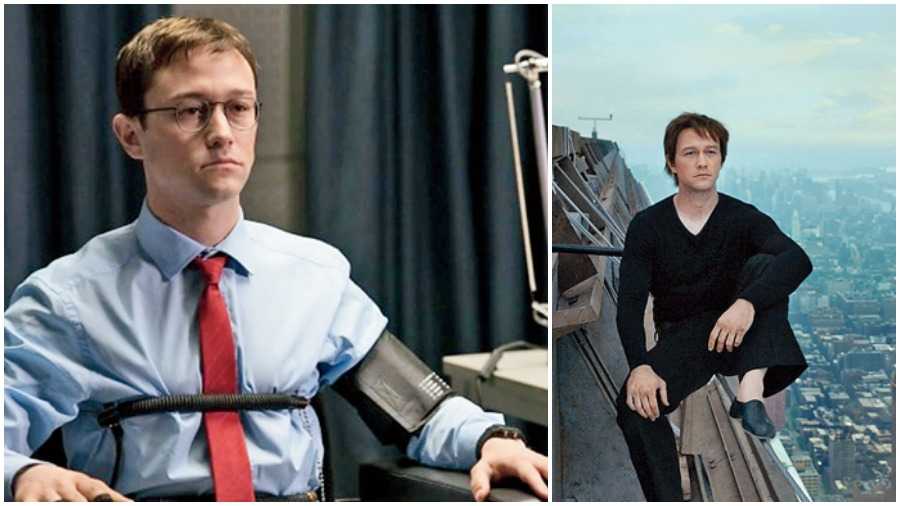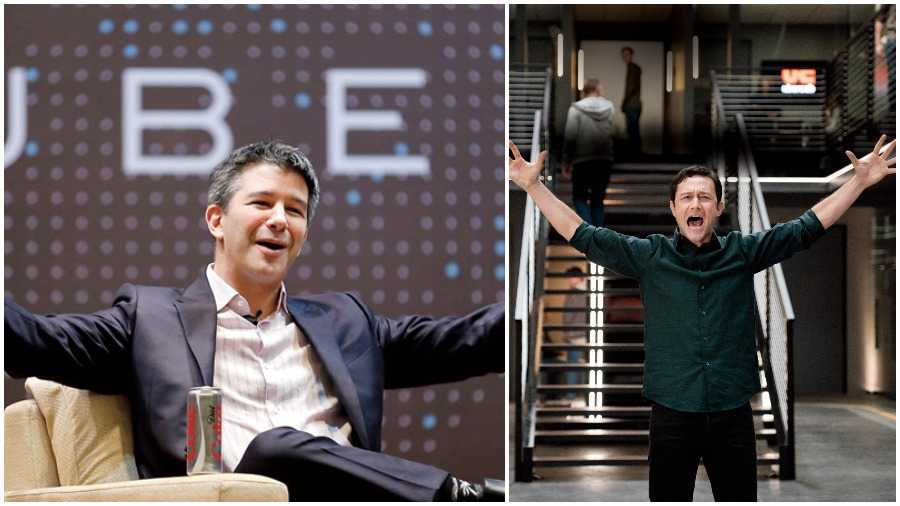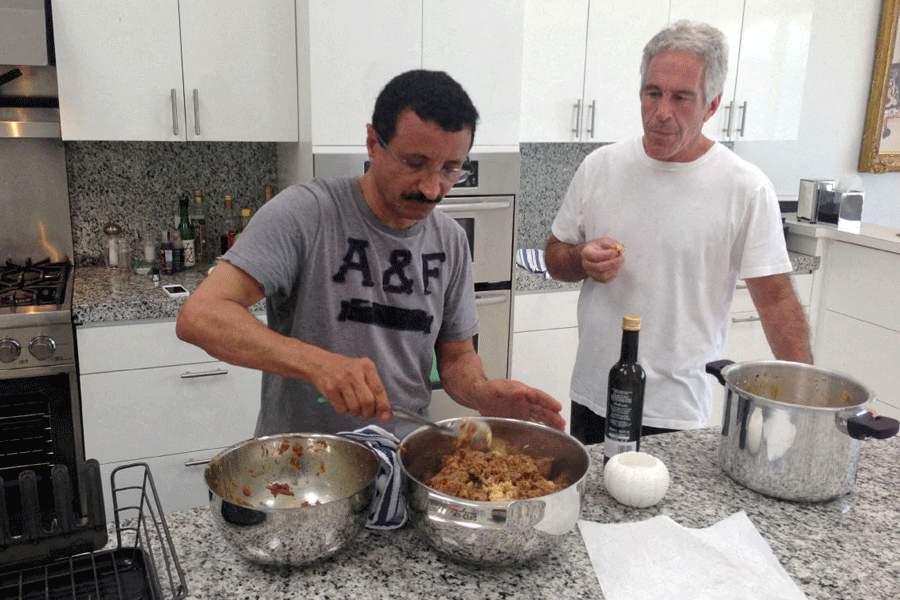Joseph Gordon-Levitt is no stranger to playing characters who, for better or for worse, have had their time in the spotlight. After playing prolific high-wire artist Philippe Petit in The Walk and the controversial whistleblower Edward Snowden in Snowden, the actor — who started out as a child artiste and has been the face of many a highly acclaimed part, notching up several awards along the way — plays Travis Kalanick, the fallen-from-grace former CEO of Uber in Super Pumped: The Battle for Uber. The series, that also stars Kyle Chandler, Elisabeth Shue and Uma Thurman, premieres on Showtime later this month. In India, viewers can watch Super Pumped on Voot Select from February 28.
Ahead of the premiere of Super Pumped, The Telegrapg logged in for a late-night video call with JGL — who has seminal films across genres like (500) Days of Summer, Inception, Looper, The Dark Knight Rises, Lincoln, and more to his credit,
besides music and directing gigs — on what went into playing Travis Kalanick, how he looks at the humanity of his characters and how this story was best suited for a series format.
Most of us like watching the smartest and most successful people achieving the heights of fame and fortune and then come crashing down. How would you explain the audience’s interest in rise-and-fall stories?
I definitely think there is something wrong with us! (Laughs) We all have the animal, primal parts of ourselves, and then we have the other reasonable part. It’s a constant battle between these two things. Travis (Kalanick) is a fascinating example of that, and that’s also part of why he’s so interesting to watch. He’s someone who indulges that primal urge very hard to win at all costs and take what he wants and say ‘to hell with everyone else’.... I think that’s an urge that every human being has to a degree because we are all animals. But then, there are the higher parts of ourselves... and that’s why civilisation hasn’t totally destroyed itself yet (laughs). As an actor, it’s fun to be able to indulge this primal side and build a character as engaging as this.
What kind of research did you do and how did that research inform the way you played Travis Kalanick?
The series is based on the book Super Pumped by Mike Isaac, the New York Times journalist. The crazy thing is that all the things that you will see on the show have really happened... they have been confirmed by first-hand sources and reconfirmed by secondary sources. I wanted to go further than what had happened and try and understand more.
I am an actor, I am not a journalist. My job is more to embody the humanity aspect. And so I talked to a wide bunch of people who had worked with Travis. I learnt a lot of things about him that are different from what you see in the press. What we read about is what he did and his questionable decisions, but if you dig deeper, you get to know how he was and why he did what he did, what he felt... he was, from what I have heard, actually quite compelling, very winning, very inspiring and really fun to be around. Those two sides were very important in order to play this character.

(L-R) Joseph Gordon-Levitt as Edward Snowden in Snowden; and as Philippe Petit in The Walk
So what’s the most surprising thing you learnt about Travis Kalanick during your research?
I was quite surprised by how well liked he was among a lot of his team. I didn’t see as much of that in the book or in the press. So it became a balancing act of playing a character that the audience can sort of fall in love with. At the same time, we are looking at the audience gasping at his unacceptable choices and behaviour. I don’t think I would have got there if I hadn’t spoken to a bunch of people who knew him.
What also surprised me — and this came from the book — was that Uber was actually breaking the law on a grand scale. Super Pumped is actually a crime story in a way. I didn’t know that they had gone that far.
What was the tightrope to walk in terms of the responsibility to be truthful to a real story and also keep in mind the viewers’ fatigue with respect to subjects dealing with toxic masculinity?
I think (show creators) Brian (Koppelman) and David (Levien) are both great at making a show which is entertaining and have the fireworks centred on characters that we both love to hate. At the same time as making a work of entertainment, we will hopefully ask some important questions. That was the balance that we were attempting at all times. We were like, ‘Hey, are we going to inspire viewers to do this bad behaviour?’ Then you can go all the way back and ask if Goodfellas inspired people to be criminals. Did The Wolf of Wall Street inspire con artists? (Smiles) Ultimately, I think it is worth portraying bad behaviour as long as you also show the consequences. This show is really unflinching in showing what Travis did, how he met his downfall....
Brian Koppelman and David Levien are the men behind Knockaround Guys, Runaway Jury, Solitary Man and, of course, Ocean’s Thirteen. Having worked with them on Super Pumped, what do you think makes them create such engaging content?
They are pretty good writers to start with. They also have a great sense of film, of music and lots of other things. But most of all, they are in love with words. For me, as an actor, that’s a treat. A lot of writing in movies and on TV is not so focused on the language. They clearly are, and within the first few pages of reading the Super Pumped script, I was like, ‘Oh, this is going to be fun!’
Super Pumped, for you, is the latest in a career of playing real-life characters. What are the biggest challenges of bringing a real person alive on screen?
First of all, you realise, ‘Oh, this person is going to see it’ (smiles). In the case of Travis, despite all that he has done, he is still a human being. I believe in judging a person’s action, but not a person’s humanity. We all have our shortcomings. I don’t defend him or all that he has done, but the idea is to find a balance and shine a light on the things that he’s done but not to demonise him. That’s not something that one tends to think of when playing a fictional character.
How do you personally look at the Uber story?
It represents the upside and the downside of drastic, fast-moving innovations. And as I mentioned, Uber breaking the laws systemically is unacceptable. Those laws are in place to protect labour. Not all laws are perfect and there is corruption in all governments, but it’s throwing the baby out with the bathwater if you say, ‘Oh, these laws don’t apply to us’. We should be taking a good, hard look at businesses like Uber, which are prioritising their profits over everything else.
Again, this isn’t just about Uber, and Uber is just part of a larger system that prioritises profits over everything. It’s pretty easy to indict Travis Kalanick and Uber, but ultimately, the game that they were playing was maximising shareholder value. That’s what all businesses are tasked with doing. Travis played that game as well as anyone else in history. But he didn’t make up the game, he was just playing it.
What we have now is well-intentioned but ultimately dangerous companies that are driving our world off the cliff. We need to fix that and talk about that, as much as our disintegrating democracy or our threatened climate. We need to ask why money is the most important thing... it shouldn’t be.
Did you reach out to Travis Kalanick before filming?
I wasn’t able to speak to him personally. Honestly, while playing him, I didn’t want to do an imitation per se. But he and I speak pretty similarly... he’s from the San Fernando Valley (in Los Angeles) and I am from there as well. Philippe Petit (real-life high-wire artist, who Joseph played in the 2015 film The Walk) is French and he definitely couldn’t have sounded like me. Edward Snowden (who Joseph played in Snowden, 2016) is from North Carolina and people there speak differently than they speak in Los Angeles. But when I hear Travis Kalanick speak, he sounds like me, or he sounds like my brother.
You have played some pretty controversial characters. Have you ever rejected a script for going too far?
I don’t think I have ever rejected a script for going too far. In fact, I am drawn to stuff that I feel really matters. It’s worth acknowledging that any work of entertainment can only go so far because entertainment is entertainment and if we really have to solve the world’s problems, we can’t do it with just our emotions... we have to do the hard work of thinking rationally in various ways. We have to accept the fact that no piece of entertainment can comprehensively speak of the world’s problems. What we have to do is inspire some good feelings and ask some good questions. Super Pumped, I feel, really does that.
Your Super Pumped co-star Uma Thurman has spoken about the sweet spot in a performance, a place where you have to be challenged enough to feel uncomfortable and yet not too uncomfortable that it makes you freeze. Did this hit the sweet spot for you?
Yes it did. That’s a lot down to the writing, and the biggest challenge was that they wrote a lot of words for me to say (laughs). I had to burn through that language quickly; the style of this show is pretty rat-a-tat-tat. I have done that a lot. In 3rd Rock From The Sun, our motto was ‘bigger, faster, funnier’. That, of course, had a different tone... it is broad, farcical comedy, but it’s still a lot of words and it goes fast. So ya, I have just worked out those muscles a lot and so it was fun to rise up to the challenge of these big monologues (in Super Pumped) and made me want to dig into this. It was fun to do and I hope it’s fun to watch.
Being a writer-film-maker yourself, how much do you think the format of a series as opposed to a film enables you to better tell this story?
That’s a great question. We had such great source material. The Mark Isaac book is such a thoroughly researched work of journalism. In the length of a feature film, we would have had to pick and choose a lot, and we would have left out a lot of the salient examples and details that you find in this book. When you watch Super Pumped, you will say, ‘Now that didn’t really happen!’ They didn’t add anything in the script that wasn’t in the book. And so I do believe a series was a better form for it.
On a lighter note, any personal experiences of being a passenger on an Uber ride?
Not recently, no. I haven’t taken one in quite sometime since we are in the middle of a plague (smiles).










